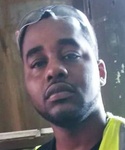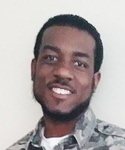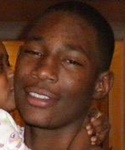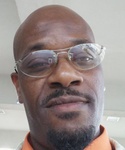By ZOE FISHER
Homicide Watch Chicago

Isaiah Carter was shot to death in November 2011 and his mother is perplexed by the lack of progress in solving the case. | photo provided
On Sundays, Isaiah Carter played Gerald Levert or Bobby Womack to coax his mother into cooking for him.
“If he wanted me to do something, he’d play music,” Angel Brown said.
While in the kitchen, she also taught him to cook a few things. Making chicken was his favorite. He would, “BBQ, fry it, boil it,” his mother said. He planned to enroll in culinary school after graduating from Manley Career Academy on the West Side in June.
Carter wanted to follow in the footsteps of his older brother, Rico Brown, who was in culinary school at the time.
“Almost everything turned out bad,” his brother said about Isaiah’s cooking experiments. “Milk and butter are not the cure to everything like we thought.”
Rico Brown dropped out of culinary school after his brother died, but now feels he has enough strength to return.
Carter was killed on Nov. 24, 2011, a day before his 19th birthday. His mother called him a “thanksgiving baby”—the youngest of her four children. Born at 28 weeks, Angel Brown gave him special attention.

Angel Brown and her grandson, Isaiah Carter Jr., often visit the grave of the boy’s father, who was shot to death five years ago before his son’s birth. | photo provided
“He was persistent to get out here,” she said, remembering her quick labor, “like an animal caged in, trying to get out and be free.”
Isaiah had special needs during his early childhood. He and his family learned sign language to communicate since he would speak incoherently. Angel Brown knew he could talk, and she could understand him, but she wanted others to understand him too.
When he started talking at age 6, she called it “music to my ears.”
She remembered his first words: “Merry Christmas, Mom.”
Brown remembers the sharp cold and rain on the day of her son’s death. She went shopping to buy him new shoes for his upcoming all-white birthday party. She specifically told him to stay in the house, but he went out anyway.
“It’s so dangerous to let him outside,” she said.
The neighborhood was in the midst of a rivalry between the Madison Avenue boys and Chicago Avenue boys, according to Angel Brown. A scuffle broke out on the street and shots were fired.
Isaiah calmly kept walking because he wasn’t involved, Angel Brown said witnesses told her. Her son had no history of gang activity and no police record, according to his mother.
He was in the “wrong place, wrong time with the wrong people,” his brother said.
Shot multiple times, he made his way to the nearest police station. He lived two weeks before he died of injuries from multiple gunshot wounds.
The details of the shooting still perplex Angel Brown. The two detectives working the case visited often the first year, but were never able to tell her exactly where the shooting happened. The address she was given, Two South Parkside, doesn’t even exist, she said.
Because of the close-knit neighborhood, witnesses gave her more details, including the name of the alleged shooter. She said detectives didn’t question him after she told them what she’d heard. She is displeased with the progress of the investigation so far, but still hopes for closure.
Rico Brown feels differently. “I wouldn’t want to know,” he said about the identity of his brother’s killer.
The family has “varying degrees of closure, but many are at peace with it,” he said.
Isaiah leaves behind a son, Isaiah Jr., who was born after his death. His mouth and nose remind grandma of her son.
Sundays are much quieter in the household now. There are rarely Sunday dinners and Angel Brown misses Isaiah telling her, “Momma, you so beautiful,” as he normally did in the morning before church.






